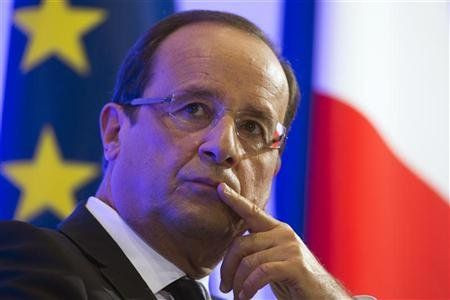Overtaxed France Needs More Leeway To Meet Deficit Targets As Growth Sags, Unemployment Rises: IMF

Hanging on to the last of its triple-A credit ratings, France is being warned by the International Monetary Fund that the government’s deficit-reduction policies are hurting growth and that it shouldn’t make further cuts even though it’s unlikely to meet 2013 European targets.
In its annual review of France, the IMF last week forecast that the French economy will grow 0.4 percent in 2013, half the government’s outlook. The weaker-than-expected growth meant that France would miss its 2013 target for a deficit of 3 percent of gross domestic product. The IMF expects a shortfall of 3.5 percent and said the difference isn’t important.
“Whether it’s 3 percent or 3.5 percent matters less than whether the government can give credible assurances about the direction of policy,” Edward Gardner, the IMF’s mission chief for France, said in a conference call on Wednesday. “Our recommendation is that France discuss the fact in a broader European context the appropriate stance for 2013.”
IMF directors said that it would be unwise for the French government, which has already passed huge budget cuts, to implement further fiscal measures in order to hit the target. “There isn’t much of a case for accelerating measures further in response to a weaker economic environment,” Gardner said.
The IMF urged the French government to spend less instead of taxing more to get the economy back on track because “there is limited scope for further increases in taxes without harming business incentives,” Gardner said.
Last week, France's parliament passed a contentious budget for next year that included a raft of new taxes. Socialist President Francois Hollande's budget aims to cut €30 billion ($40 billion), with two-thirds of that coming in tax hikes, including a 75 percent levy on incomes earned over €1 million. In its report, the IMF noted that "with rates of taxation already among the highest in Europe, the ratcheting up of the tax burden in 2012–13 places France at an additional competitive disadvantage relative to its peers."
The IMF called on France to reduce the cost of labor and ease labor regulations to regain lost competitiveness. "French labor costs are much higher than in other countries, and high labor costs also mean narrower profit margins, which in turn mean less capacity to invest and innovate," Gardner said.
The Centre for Economics and Business Research (CEBR) predicts that the size of France’s economy will fall behind the likes of Britain, Russia and India by 2022.
The IMF said last week that there was a “high” risk of further credit downgrades in 2013 if France's predicted growth of 1.7 percent in 2013 did not materialize. “France’s sovereign rating faces the risk of further reductions because of its relatively high public debt stock and budget deficit relative to other AAA-rated European countries,” it said.
Two of the big three international ratings agencies have already stripped France of its prized triple-A rating, but Paris-based Fitch Ratings this month affirmed it, albeit with a negative outlook.
European Union Economic and Monetary Affairs Commissioner Olli Rehn said last week that France needed more reform rather than more austerity.
"Additional savings measures are not essential," Rehn told the French daily Le Monde, saying a public deficit of 3 percent of GDP remained the target but adding that once a credible medium-term budget plan backed up by reforms was in place "you can have a slower adjustment.”
Spanish newspaper El Pais reported on Saturday that the European Commission would propose that Spain, France and several other euro zone countries be given more time to cut their public deficits below the target limit of 3 percent of GDP.
In November, the French government reacted angrily when the Economist magazine's front cover -- which showed seven baguettes held together by a French tricolor with a lit fuse protruding from the center -- described France as the "time bomb at the heart of Europe" because of its high public spending and unemployment. An accompanying editorial raised concerns that Hollande's economic reforms are not ambitious enough and are jeopardizing the future of the euro.
The French Finance Minister Pierre Moscovici called the report an "absurd and groundless" exercise in "French bashing," while Prime Minister Jean-Marc Ayrault accused the Economist of sensationalism. "You are talking about a newspaper which is resorting to excess to sell paper. I can tell you that France isn't at all impressed," he told French TV.
French jobless data released Thursday showed the number of unemployed people rose by 0.9 percent in November, the 19th consecutive monthly rise, to hit a nearly 15-year high.
The central statistics bureau Insee estimated this month that the French economy would contract in the last quarter of 2012 and grow only modestly in the first half of 2013.
© Copyright IBTimes 2024. All rights reserved.






















